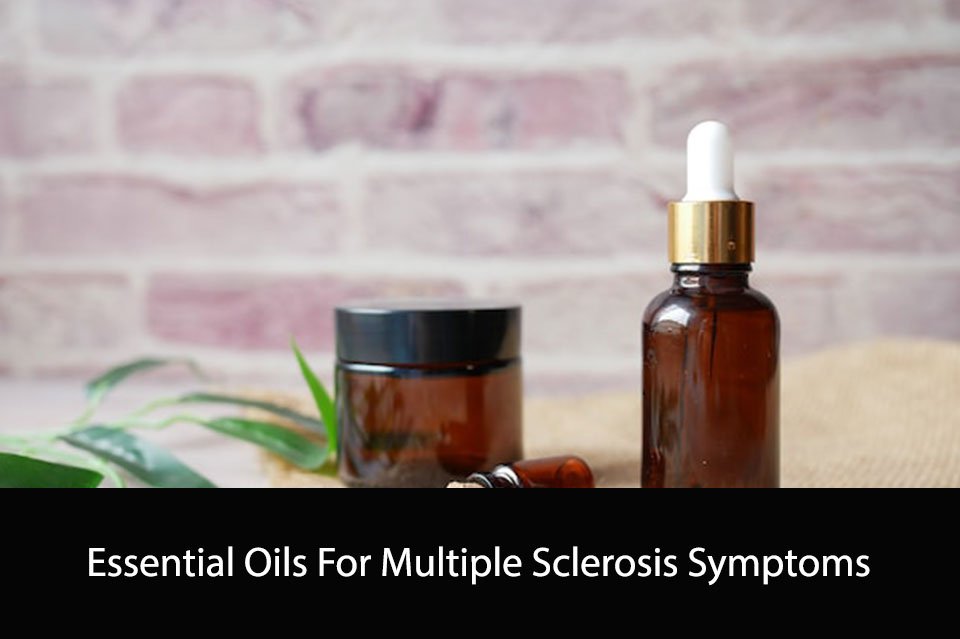Essential oils have been used for centuries to alleviate various ailments, including those associated with multiple sclerosis (MS). MS is a chronic autoimmune disease that affects the central nervous system, causing a range of symptoms such as muscle weakness, tremors, and fatigue. While there is no cure for MS, essential oils may provide some relief from the symptoms.
Research has shown that certain essential oils have anti-inflammatory and analgesic properties, which can help reduce inflammation and pain associated with MS. These oils can also help improve mood and reduce anxiety, which are common symptoms of MS. Some of the most commonly used essential oils for MS include lavender, peppermint, frankincense, and eucalyptus.
It is important to note that essential oils should never be used as a substitute for medical treatment. However, when used in conjunction with traditional medical treatments, they may provide additional relief from MS symptoms. In this article, we will explore the benefits of essential oils for MS symptoms and how they can be used safely and effectively.

Understanding Multiple Sclerosis
Causes and Symptoms
Multiple Sclerosis (MS) is a chronic autoimmune disease that affects the central nervous system. The cause of MS is not fully understood, but it is believed to be a combination of genetic and environmental factors. MS occurs when the immune system attacks the myelin sheath, which is the protective covering that surrounds nerve fibers. This damage disrupts the communication between the brain and the rest of the body, leading to a wide range of symptoms.
The symptoms of MS can vary widely from person to person and can include:
- Fatigue
- Numbness or tingling in the limbs
- Difficulty walking or maintaining balance
- Muscle weakness or spasticity
- Blurred or double vision
- Cognitive impairment
- Depression or anxiety
These symptoms can come and go, and can range from mild to severe. MS is a progressive disease, meaning that symptoms tend to worsen over time.
There is no cure for MS, but there are treatments available to help manage symptoms and slow the progression of the disease. Essential oils have been used as a complementary therapy for MS symptoms, but it is important to note that they should not be used as a replacement for medical treatment. It is important to talk to a healthcare provider before using essential oils for MS.
Essential Oils: An Overview
Essential oils are highly concentrated plant extracts that are used for their therapeutic properties. They are commonly used in aromatherapy to promote relaxation, reduce stress, and alleviate pain. Essential oils have also been found to be effective in managing symptoms of multiple sclerosis (MS).
There are many different types of essential oils, each with its unique properties and benefits. Some of the most commonly used essential oils for MS symptoms include:
- Lavender: Known for its calming and relaxing properties, lavender oil can help alleviate anxiety and promote restful sleep.
- Peppermint: Peppermint oil has analgesic and anti-inflammatory properties that can help relieve pain and inflammation associated with MS.
- Frankincense: Frankincense oil has been found to have anti-inflammatory properties that can help reduce inflammation in the body and alleviate pain.
- Eucalyptus: Eucalyptus oil has antispasmodic properties that can help reduce muscle spasms and cramps associated with MS.
When using essential oils, it’s important to dilute them with a carrier oil such as coconut oil or jojoba oil, as they are highly concentrated and can cause skin irritation if applied directly to the skin. Essential oils can be used in a variety of ways, including aromatherapy diffusers, topical application, and inhalation.
It’s important to note that while essential oils can be effective in managing MS symptoms, they should not be used as a substitute for medical treatment. It’s always important to consult with a healthcare professional before starting any new treatment regimen.
How Essential Oils Can Help with Multiple Sclerosis Symptoms
When it comes to managing multiple sclerosis (MS) symptoms, essential oils can be a helpful addition to traditional treatments. Here are some of the ways essential oils can help:
Pain Management
MS can cause a variety of pains, including muscle spasms, neuropathic pain, and headaches. Essential oils like peppermint, lavender, and frankincense have been shown to have analgesic properties that can help alleviate pain.
Peppermint oil, for example, contains menthol, which has a cooling effect that can help soothe sore muscles. Lavender oil has been shown to have anti-inflammatory and analgesic effects that can help reduce pain. Frankincense oil has been used for centuries to treat pain and inflammation, and recent studies have shown that it may have analgesic effects.
Reducing Fatigue
Fatigue is a common symptom of MS that can be debilitating. Essential oils like lemon, grapefruit, and peppermint can help reduce fatigue and increase energy levels.
Lemon oil has a refreshing scent that can help invigorate the senses and boost energy levels. Grapefruit oil has been shown to have stimulating effects that can help reduce fatigue. Peppermint oil has a cooling and invigorating effect that can help reduce fatigue and increase alertness.
Improving Sleep
MS can also cause sleep disturbances, which can further exacerbate other symptoms. Essential oils like lavender, chamomile, and bergamot can help improve sleep quality.
Lavender oil has been shown to have sedative effects that can help promote relaxation and improve sleep quality. Chamomile oil has also been shown to have sedative effects and can help reduce anxiety, which can interfere with sleep. Bergamot oil has a calming effect that can help promote relaxation and reduce stress, which can also improve sleep quality.
In conclusion, essential oils can be a helpful addition to traditional treatments for managing MS symptoms. However, it’s important to talk to your doctor before using essential oils, as they can interact with certain medications and may not be appropriate for everyone.

Specific Essential Oils for Multiple Sclerosis Symptoms
Lavender
Lavender essential oil is known for its calming and relaxing properties. It can help alleviate anxiety, stress, and depression, which are common symptoms of multiple sclerosis. Lavender oil can also help improve sleep quality, which is essential for people with MS who may experience fatigue or insomnia.
To use lavender oil, add a few drops to a diffuser or mix with a carrier oil and apply topically. It can also be added to a warm bath for a relaxing soak.
Peppermint
Peppermint essential oil has a cooling and invigorating effect that can help alleviate MS-related symptoms such as fatigue, brain fog, and headaches. It can also help improve digestion, which is important for people with MS who may experience gastrointestinal issues.
To use peppermint oil, add a few drops to a diffuser or mix with a carrier oil and apply topically. It can also be added to a warm compress or used in a massage.
Frankincense
Frankincense essential oil has anti-inflammatory and analgesic properties that can help reduce MS-related symptoms such as pain, inflammation, and muscle spasms. It can also help improve cognitive function and mood.
To use frankincense oil, add a few drops to a diffuser or mix with a carrier oil and apply topically. It can also be added to a warm compress or used in a massage.
Overall, essential oils can be a helpful addition to a comprehensive MS treatment plan. However, it is important to consult with a healthcare professional before using essential oils, especially if you are taking medications or have any underlying health conditions.
How to Use Essential Oils Safely
When it comes to using essential oils for multiple sclerosis symptoms, it’s important to use them safely. Here are some tips to help you use essential oils safely:
- Always dilute essential oils: Essential oils are highly concentrated and can be irritating to the skin if used undiluted. Dilute essential oils with a carrier oil before applying them to your skin. A good rule of thumb is to use 1-2 drops of essential oil per teaspoon of carrier oil.
- Test for sensitivity: Before using a new essential oil, test it for sensitivity. Apply a small amount of diluted essential oil to your skin and wait 24 hours to see if you have any adverse reactions.
- Avoid sensitive areas: Essential oils should not be applied to sensitive areas such as the eyes, ears, or genitals. If you are unsure where to apply an essential oil, consult a qualified aromatherapist.
- Use quality oils: Make sure you are using high-quality, pure essential oils. Look for oils that are labeled as “therapeutic grade” or “pure essential oil.”
- Use caution during pregnancy: Some essential oils should be avoided during pregnancy. Consult a qualified aromatherapist before using essential oils if you are pregnant or nursing.
- Follow dosage guidelines: Essential oils should be used in small amounts. Follow dosage guidelines carefully and do not exceed recommended amounts.
By following these tips, you can use essential oils safely and effectively for multiple sclerosis symptoms.
Potential Risks and Side Effects
When using essential oils to manage multiple sclerosis symptoms, it is important to be aware of potential risks and side effects. While essential oils are generally safe when used correctly, improper use can lead to adverse reactions.
Some potential risks and side effects of essential oils include:
- Skin irritation: Essential oils are highly concentrated and can cause skin irritation if not properly diluted. Always dilute essential oils with a carrier oil before applying to the skin.
- Allergic reactions: Some people may be allergic to certain essential oils. It is important to perform a patch test before using a new essential oil and to discontinue use if an allergic reaction occurs.
- Photosensitivity: Some essential oils, such as bergamot and lemon, can cause photosensitivity, which can lead to skin damage when exposed to sunlight. Avoid applying these oils to the skin before sun exposure.
- Interactions with medications: Essential oils can interact with certain medications, including blood thinners and antidepressants. Consult with a healthcare provider before using essential oils if taking medication.
- Toxicity: Essential oils can be toxic if ingested in large quantities. Keep essential oils out of reach of children and pets and never ingest essential oils.
In summary, essential oils can be a helpful tool in managing multiple sclerosis symptoms when used safely and correctly. Be aware of potential risks and side effects and always consult with a healthcare provider before using essential oils, especially if taking medication.
Conclusion
In conclusion, essential oils can be an effective complementary therapy for managing symptoms of multiple sclerosis. While more research is needed to fully understand the benefits of essential oils for MS, existing studies suggest that certain oils can help alleviate pain, improve mood, and reduce inflammation.
When using essential oils for MS, it’s important to choose high-quality, pure oils and to use them safely. Always dilute essential oils before applying them topically, and avoid ingesting them unless under the guidance of a qualified healthcare professional.
Some of the best essential oils for MS symptoms include lavender, peppermint, frankincense, and chamomile. These oils can be used in a variety of ways, including through aromatherapy, massage, and topical application.
Overall, incorporating essential oils into a comprehensive MS management plan can be a safe and effective way to improve quality of life. As with any new therapy, it’s important to consult with a healthcare provider before starting to use essential oils.

Frequently Asked Questions
Can CoQ10 worsen multiple sclerosis symptoms?
CoQ10 is a naturally occurring substance in the body that plays a role in energy production. While some studies have suggested that CoQ10 may have potential benefits for MS, there is no clear evidence to suggest that it can worsen MS symptoms. However, it is always important to consult with a healthcare professional before starting any new supplement or treatment.
What are the benefits of using Young Living Essential Oils for MS?
Young Living Essential Oils are known for their high quality and purity. While there is limited scientific research on the use of essential oils for MS, some people with MS have reported benefits such as reduced stress and improved sleep. It is important to note that essential oils should not be used as a replacement for medical treatment, but rather as a complementary therapy.
Which essential oil is effective for managing MS symptoms?
There is no one-size-fits-all answer to this question as different essential oils may work better for different people. Some commonly used oils for MS include lavender for relaxation, peppermint for pain relief, and frankincense for reducing inflammation. It is important to consult with a healthcare professional and do your own research before using essential oils.
What are some safe ways to use essential oils for MS?
Some safe ways to use essential oils for MS include diffusing them in a well-ventilated area, diluting them with a carrier oil before applying topically, and using them in a bath. It is important to always follow the recommended usage instructions for each oil and to avoid ingesting them.
What natural remedies can help relieve MS symptoms?
In addition to essential oils, some natural remedies that may help relieve MS symptoms include exercise, a healthy diet, stress management techniques, and getting enough sleep. It is important to consult with a healthcare professional before starting any new treatment.
What are some effective ways to reduce inflammation in multiple sclerosis?
Some effective ways to reduce inflammation in MS include eating an anti-inflammatory diet, getting regular exercise, managing stress, and using natural supplements such as omega-3 fatty acids. It is important to consult with a healthcare professional before starting any new treatment.





